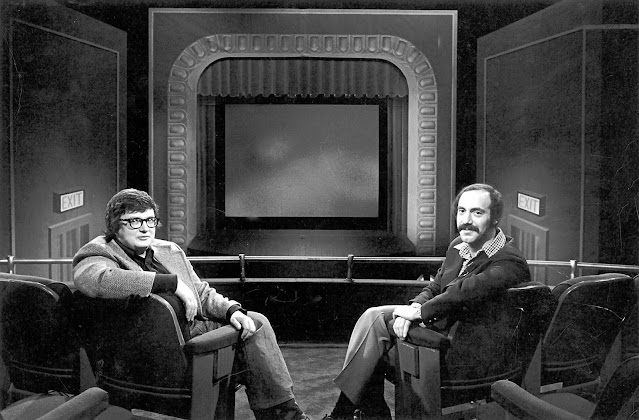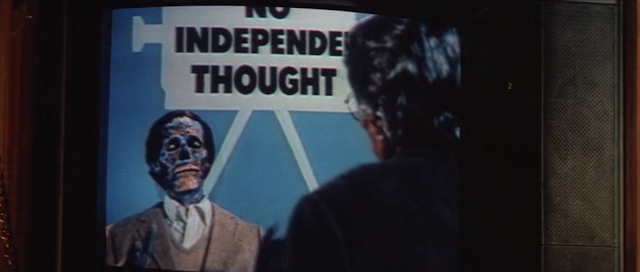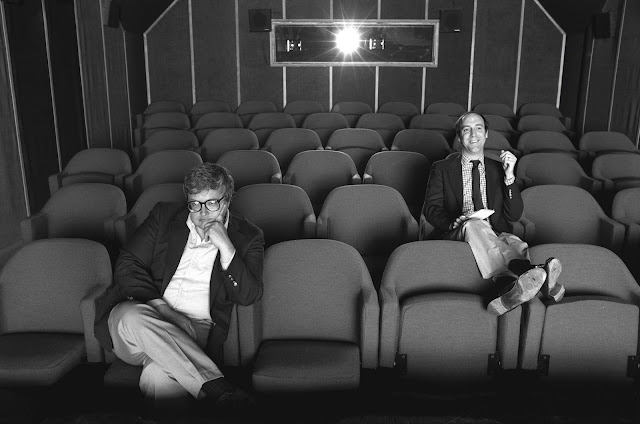I could've taped it and watched later in the day, but it was partly the act of lying in bed half awake and absorbing some Film banter that contributed to the very identifiable experience. But there was also an anxious impatience: during the years in which I religiously watched their half-hour syndicated TV program, there was a solid chance they'd be discussing a movie I'd just seen a day or two prior and I needed to know whether or not they had a similar experience as myself. It was a pleasure to listen to two articulate professionals discuss something I'd just witnessed firsthand and it was exciting to vicariously share my adventures with two people on TV, but this was a time when it was a paramount of importance to me that either critic or both critics felt the same way about a movie as I did.
I've never met anyone who didn't have a strong opinion on one or both of them (and by "strong opinion" I mean strongly dislike). This was typically because someone got wind that they gave a thumbs down to a movie they liked and so they dismissed their credibility entirely. I would approach the show with the same mentality as watching the Academy Awards, "Oh I hope the movie I like is recognized for its greatness!" And with that superficial approach we would find ourselves on the same page about 50% of the time, but it was never that superficial; sometimes they liked something way more than I did or not quite as much, or completely demonized something I vaguely didn't care for. They very often gave "marginal thumbs" in either direction, they gave mixed reviews with mixed feelings, they liked the performances but not the script, the ending ruined it, one supporting character made the whole picture worth it; they analyzed with an entirely subjective approach, they gave reasons and their reasons were their own.
In their written reviews they used the 1-4 Star rating system, but their major contribution to criticism (and culture) was the thumbs made famous on their TV show starting in 1975. It feels drenched in irony now that movies are literally ranked and sold on a point system determined by a faceless community with questionable motivations. The thumbs signaled an allowable absence of nuance but behind them were two passionate film lovers who expressed elaborate opinions in their writing and on their show, and their definitive "yes" or "no" gimmick was often cloaked in variables that were ignored on the video covers.
It's fascinating and actually kind of exciting to me that people felt strongly enough to "hate" Siskel or Ebert or both, or even to prefer one over the other because this just indicates that people feel strongly enough about movies that they reflexively dismiss a whole other person for simply disagreeing. When I started watching them regularly in the early 1990s I remember how disheartening it was to wake up on Sunday morning and watch them crucify some wonderful picture I saw the previous afternoon. When they would meticulously deconstruct every flaw of some film I liked it made me question my own perspective. Am I wrong? Did I not understand it? Do I just like bad movies? They certainly never ever made me change my mind but I'd listen to their reasons and begin to recognize the subjective language they used and so I started to build my own vocabulary out of pure defense. They had their own agenda, their own criteria regarding what Cinema should or shouldn't be (most people do) and they maintained a vigilant, sometimes bombastic, often hilarious balance between what they thought was right and what they knew was right. They jokingly came across as pompous and elitist, and the secret punchline to that joke was always in plain sight: they were two different people.
They were subject to parody for as long as they were around, and the easiest thing about them to parodize was their arguing. That should still be the ongoing clue to the idea of how personal and impressionistic art is: here were 2 intelligent guys who loved movies equally and they only ever agreed about half the time. And despite what viewers and readers claimed there was no predictable formula regarding who liked what; Gene liked Die Hard, Roger didn't / Roger liked What About Bob?, Gene didn't / Gene liked Batman, Roger didn't / Roger liked Silence of the Lambs, Gene didn't, and so on and so on. This all harkens back to my continuing complaint regarding the frustrating and absurd notion of the imaginary division between "good movies" and "movies I like." These guys didn't subscribe to that horseshit, they went in cold every time and left with their own thoughts and died on their own hills and bowed to no one. They themselves were often criticized by other film critics for not taking a more objective approach when recommending a movie to the public - Roger always asserted the opposite, stating "...I'm not proposing objective truth, but subjective reactions; a review should reflect the immediate experience."
There will forever be that stint in the 1980s that quaked their credibility. They were uniformly turned off by the Slasher subgenre and suddenly their blunt movie critiques turned into sharp sermons on the sick state of society; they were still openly judgmental about the quality of these crap films, but they consciously became puritanical crusaders as they decided to turn a trend into some sorta satanic pandemic. Now I know I certainly wouldn't call myself a Slasher Fan in italics but with the advantage of hindsight they're easier to digest as a nostalgic novelty of a bygone era. But for them, having to sit through these mean-spirited snooze fests every week for years on end, it must've seemed like the future of Cinema was toppling around them. (I know this feeling.) They recommended a fair share of Thrillers, Violent movies, Horror movies, and it's not that their standards were high, they were narrow - the subgenre was so formulaic that it nearly became its own style of filmmaking that didn't need to follow the rules of regular movies (plot, tension, character development) and when they simply didn't tune into it they became angry; they were giving them the same amount of attention and respect as Blue Velvet or Platoon, which is polite but perhaps incorrect. And because these movies were so popular, their anger was aimed partially at the audience.
The very superficial role of a professional critic is supposedly to steer an audience in the right direction - presumably for people who want to go out to the movies and legitimately have no knowledge or preconceptions about what's out there. And I'm sure these people exist, especially in pre-internet days, but like a lotta people I don't look to Film Criticism for recommendations per se, but more of like a literary or analytical camaraderie, and what Siskel and Ebert tapped into is similar to the current appeal of podcasts: the dynamic of dialogue rooted in otherwise trivial subject matter. Three's a crowd and my own presence in their company completes that circle.
They'd speak into the camera like any critic, like any news anchor, like any Youtube vlogger, and then they'd turn and face each other and agree or debate and that's when the energy would shift - they'd go off script and the snooty facade they were best known for would evaporate and their wry (often argumentative) honesty would explode in a messy but still precise way. And this was where their purest and most interesting and invested form of film criticism could be found; Roger's writing was always readily available in his dozens of books and Gene had national accessibility with a column in TV Guide, but this candid off-the-cuff parley was more revealing and informative than any thousand word essay. Gene said "...one absolute essential part of our credentials... is that you believe that that is what we actually think." They never pandered to the public or purposefully ran with whatever the other critics said, and their reasons for liking or disliking something was guided by personal taste.
The thing about taste is: supposedly there's no accounting for it. Sometimes their taste was misguided or compromised, but only ever by their own natural instincts. They hated nearly all the Kids Films from my kid years: Ninja Turtles, Beetlejuice, The Wizard, Little Monsters, Milo & Otis, Howard the Duck, Short Circuit, Home Alone, Honey, I Shrunk the Kids, and frankly pretty much everything else that defined a generation was deemed too dark or too dumb to recommend to impressionable minds. But at the core of each of these cautionary crucifixions, they themselves simply didn't like the movie. Roger once confessed to Gene, on camera, that he didn't much like Unforgiven the first time he saw it because he'd been anticipating a marriage proposal to his wife, Chaz, and he was too distracted while viewing. That's an entirely valid and human situation, but the very casual and public admission of it is the true revelation: both critics effortlessly captured the balance of strong conviction and the fallacy of preference. Both of them rarely went out of their way to explain what a movie meant to them on a personal level because it ideally should be an unspoken approach in any art form; the idea that even an ounce of objectivity should be applied to good or bad movies isn't unique to modern times but it's become plainly prevalent, and that concept was refreshingly lost on these guys; they couldn't understand that Slasher movies were made for a particular audience, all they knew was they personally didn't like them.
It seems with each new generation a new set of standards or criteria needs to be applied to movie criticism (this occurs as the movies themselves change). In the internet age everyone's a critic - up to and including the professionals, and they themselves are susceptible to more brutal and immediate criticism than any movie. Thus and so, movie reviews become more grey and less passionate to avoid a wrathful comment section and suddenly every film makes the Dean's List before the buzz can cannibalize itself. Look how many people "hated" Gene and Roger - not that they didn't know but they were made of sterner stuff. But the time of the tough critic has passed as this art form unto itself has become more malleable, and I find myself "binging" episodes of At The Movies on Youtube into the wee hours of the morning, being reminded of pictures I'd forgotten and getting the straight dope on stuff I'd always been curious about. Streaming and Home Video can usher me into my twilight years, or until modern movies dramatically shift into a more suitable paradigm that's to my liking. And until then, the balcony is closed.
- Paul

































































No comments:
Post a Comment